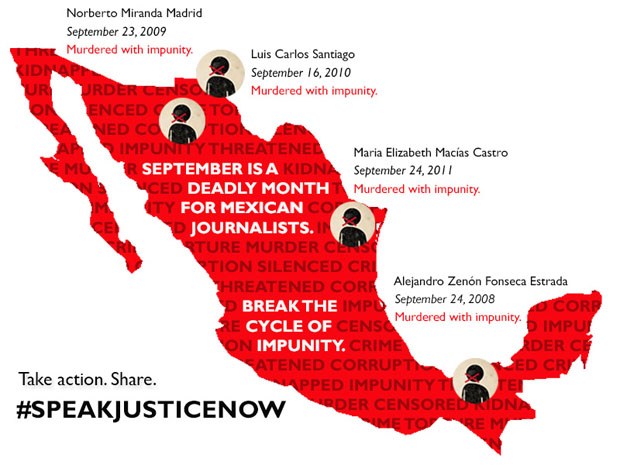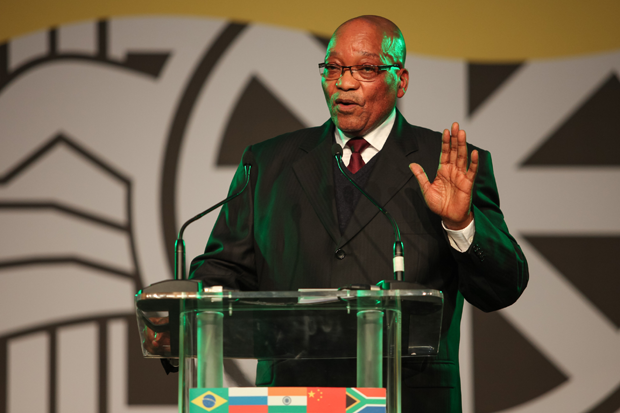24 Sep 2013 | Americas, Mexico, News and features
 This September marks the anniversary of the murders of four Mexican journalists. Alejandro Zenón Fonseca Estrada, Norberto Miranda Madrid, Luis Carlos Santiago and Maria Elizabeth Macías Castro were each killed within a year of each other, from 2008 to 2011. They were all covering drug cartels and corruption, and not a single person has been brought to justice in these murder cases.
This September marks the anniversary of the murders of four Mexican journalists. Alejandro Zenón Fonseca Estrada, Norberto Miranda Madrid, Luis Carlos Santiago and Maria Elizabeth Macías Castro were each killed within a year of each other, from 2008 to 2011. They were all covering drug cartels and corruption, and not a single person has been brought to justice in these murder cases.
Alejandro Zenón Fonseca Estrada, 33, host of a popular morning call-in show called “El Padrino Fonseca” (The Godfather Fonseca) was gunned down on September 24, 2008, by unidentified men as he was hanging up anti-violence posters.
Norberto Miranda Madrid, 44, was a Web columnist and host for the online station Radio Visión. He was shot multiple times by two masked gunmen in the offices of the radio station on September 23, 2009.
Luis Carlos Santiago worked as a photographer with the local daily El Diario. On September 16, 2010, he was shot and killed by unidentified gunmen. He was 21.
Maria Elizabeth Macías Castro, 39, tweeted about activities of criminal groups and covered the topic on the website Nuevo Laredo en vivo (Nuevo Laredo Live) using the pen name “La NenaDLaredo” (The girl from Laredo). On September 24, 2011, her decapitated body was found with a note that identified the website and her pseudonym.
Speak Justice Now is a campaign against impunity by the Committee to Protect Journalists. We encourage you to join thousands around the world to tweet Mexican President Enrique Peña Nieto today demanding an end to impunity using the hashtag #SpeakJusticeNow.
23 Sep 2013 | News and features, Politics and Society, South Africa

Jacob Zuma (Photo: Jordi Matas / Demotix)
South Africa’s ruling African National Congress (ANC) has changed tack in its campaign to curtail the media. In a turn to what could be called “censorship lite”, the iron fist of state security intervention is being augmented by the velvet glove of calls for “patriotic” journalism.
After President Jacob Zuma’s ascendancy to the highest position in the ANC in 2007, various attacks have been launched on the private and public media. While factional battles for political control were being fought at the public broadcaster, an investigative journalist was illegally arrested after exposing corruption involving the newly appointed police commissioner. Despite concerted resistance across the social spectrum, the Protection of State Information Bill (dubbed the “Secrecy Bill”) was adopted, which will all but stop whistle blowing and investigate journalism into state corruption. And a media appeals tribunal has been mooted that could mete out punishments ranging from fines to jail time to media houses and individual journalists who offend politicians. While Zuma has referred the Secrecy Bill back to parliament for minor adjustments before signing it into law, the establishment of the tribunal is due to be considered by the country’s parliament, as per a policy decision of the ANC.
In recent times, individuals known to be close to Zuma and the ANC have gained greater influence in the media. This development seems to have precipitated a new softly-softly approach of edging the private media towards news reporting that is more amenable to dominant political interests. Zuma recently made a call for “patriotic journalism” which dovetails with a number of other initiatives by his allies in the media. The public broadcaster and two private media companies have all vowed to shift the media away from reporting on the “opposite of the positive”, as Zuma put it.
Zuma’s call was made in an off-the-cuff address at parliament. He told journalism students that, “When I go out, people envy South Africans, they wish they were South Africans because they say we are doing so well, we are succeeding… they love it. But when I am in South Africa, every morning you feel like you must leave this country because the reporting concentrates on the opposite of the positive.”
He asked the students: “Who do you think in reality you serve when reporting: the interest of the public that you claim, as the media you stand for, or the interest of the owners and managers of the paper? What is it that you think is happening, particularly in a country that is supposed to be an example with vibrant democracy, transparency, high morals, everything. How do we handle this?” Zuma expressed the hope that the South African media would learn from Mexico’s “patriotic journalism” which avoids reporting on crime and rather “markets” the country to foreigners.
His utterances follow a call by the acting chief operating officer of the South African Broadcasting Corporation (SABC), Hlaudi Motsoeneng, that 70% of the public broadcaster’s news reports should be positive. He told the Mail and Guardian that, “we want to concentrate more on positive stories, rather than to put everything in a negative way. Before you become a manager at the SABC, you first have to be a citizen of this country. You should love this country… The message I put out very strongly at the SABC is to think about the positive when people go out and do stories. The difference is our own citizens are tired of crime and tired of people talking about negative things.” Motsoeneng is a known Zuma acolyte who has controversially held onto his post after being dismissed by the previous SABC board.
Meanwhile, businessman Iqbal Survé, who enjoys close ties with the ANC, became the new owner of Independent News & Media, which comprises the largest collection of English-language daily and weekly newspaper titles in the country. He explained part of the rationale for the purchase as being: “We felt the media was not representing the positive aspects of South Africa. What we are reading about is not what we see in South Africa.”
During this same period, Indian business associates and friends of the Zuma family launched ANN7, a new satellite news service. The Gupta family recently provoked outrage for using a military air base near South Africa’s capital Pretoria to fly in guests from India for a private wedding function. The former head of government communications, Jimmy Manyi, hosts a talk show on the channel. Manyi is no stranger to controversy, having spearheaded attacks against the media during his time as government spokesperson, such as using state advertising spending to put pressure on media outlets. In an interview about his new job as talk show host, he declared South Africans to be tired of negative press and that ANN7 will provide an alternative.
ANN7’s broadcasts have been riddled with more than the usual share of start-up problems, leading to much ridicule. The company also had to withdraw a billboard advertisement describing competitors as “old farts”, after a complaint from the South African Older Persons Forum. Postings of “ANN7 bloopers” on YouTube led to a copyright complaint from ANN7 and the removal of the clips, but they can still be viewed elsewhere.
The mirth that greeted ANN7 was also evident in responses to Zuma’s call, both in articles and tweets. More serious critiques included an article from Media Monitoring Africa, while others pointed out that Mexico has one of the worst press freedom records in the world.
Thus far, velvet glove of censorship lite has not succeeded in massaging the established private media into a more “patriotic” stance. This may change when the iron fist of criminalisation of critical journalism finally comes crashing down.
This article was originally posted on 23 Sept 2013 at indexoncensorship.org
23 Aug 2013 | Guest Post, Religion and Culture
 After a long day of work and parenting, my wife and I read our child stories in the hope that her five-year old brain and body will drift into slumber before ours do. This time spent together reading is a special, private respite from the demands of the day. We bond and have fun and our daughter learns about the world through the books we choose to read.
After a long day of work and parenting, my wife and I read our child stories in the hope that her five-year old brain and body will drift into slumber before ours do. This time spent together reading is a special, private respite from the demands of the day. We bond and have fun and our daughter learns about the world through the books we choose to read.
The magic of this bedtime ritual was recently threatened when a well-meaning relative invited Callista Gingrich to join us by giving our daughter her book, Sweet Land of Liberty, as a birthday gift. As parents on the other end of the political spectrum, the sight of the happy Republican elephant on the cover waving an American flag with its trunk while staring at the Statue of Liberty (next to a seagull that looks curiously like a shrunken bald eagle) evoked cringes and irritation.
My wife and I noted that “shelving” the book could teach our child that generous gifts can be easily discarded and that it is acceptable to allow them to go unappreciated. We decided that we would read the book at bedtime and that we would, no matter how tempting, not ridicule the book. I faithfully carried out the reading phase of the decision but was unable to resist ridicule.
America is a special country with amazing wealth and an impressive capacity for innovation and industry. That being said, the first paragraph on the first page states that the elephant was “eager to see how America became the land of the free.” I know my nation’s national anthem contains those lyrics but our child must know that America is not the only land whose citizens are free. We discussed how people in many other countries are similarly free to do as they please.
The next page addresses the arrival of the pilgrims to North America. It states of the pilgrims, “with the help of God, they survived cold and beast and celebrated together with a Thanksgiving feast.” The illustration shows Native Americans and pilgrims at a table together with the Native Americans looking to the pilgrims with approving and admiring smiles. We talked about how, in addition to any help from God, the Native Americans taught the pilgrims skills for surviving in the new world and that, without those skills, the pilgrims were suffering badly. They deserved the pilgrims’ thanks too.
It was on the page addressing Abraham Lincoln that I was most bemused. Calista writes “throughout the Civil War, President Lincoln stood tall. His leadership was admired by one and by all.” At that point in the book and the day, I could only muster the crack that, while I am no historian, I am quite confident that there was at least one man that did not admire Linclon’s leadership or, if he did, he had a very strange way of showing his admiration.
In all fairness, Olive did say that the elephant is cute.
Bryan Biedscheid is an attorney in Santa Fe, New Mexico
This article was originally published on 23 Aug, 2013 at indexcensorship.org. Index on Censorship: The voice of free expression
9 Aug 2013 | In the News
#DONTSPYONME
Tell Europe’s leaders to stop mass surveillance #dontspyonme
Index on Censorship launches a petition calling on European Union Heads of Government to stop the US, UK and other governments from carrying out mass surveillance. We want to use public pressure to ensure Europe’s leaders put on the record their opposition to mass surveillance. They must place this issue firmly on the agenda for the next European Council Summit in October so action can be taken to stop this attack on the basic human right of free speech and privacy.
(Index on Censorship)
CHINA
Fault Lines Laid Bare in Hong Kong
To her supporters, Alpais Lam Wai-sze, an award-winning primary schoolteacher who shouted obscenities at the Hong Kong police last month over their handling of a street dispute between a pro-Chinese Communist Party group and an anti-Communist group, is a free-speech heroine.
(The New York Times)
GAZA
Gazans Use Satire to Bypass
Political Censorship
Cynical television presenters such as Egyptian Bassem Youssef may soon no longer appear on Palestinian television outlets as a result of the increased censorship imposed on local media. Yet, this same censorship has stood helpless with the spread of sarcastic literature and media published on social networking sites.
(Al Monitor)
MEXICO
Mexico: self-censorship for survival
Journalists in Mexico are increasingly publishing their articles anonymously. Attaching your name to a report, an article or a picture is an obligation and a right. But doing so in Mexico can cost journalists their jobs or their lives. The biggest danger facing reporters there is not being hit by a stray bullet. No, the main peril is being murdered in order to silence and censor the media.
(Radio Netherlands)
PAKISTAN
Pakistani artists challenging YouTube ban
YouTube is a source of entertainment and news for billions around the world, but Pakistanis have lost access to the video site for almost a year after clips of the controversial film “Innocence of Muslims” prompted a government ban.
(CNN)
SINGAPORE
Singapore: End ‘Scandalizing the Judiciary’ Prosecutions
Singapore’s Attorney General’s Chambers should cease using contempt of court charges to muzzle critics of the judiciary.
(HRW)
TURKEY
Singapore: End ‘Scandalizing the Judiciary’ Prosecutions
Singapore’s Attorney General’s Chambers should cease using contempt of court charges to muzzle critics of the judiciary.
(HRW)
UNITED STATES
The more nefarious US foreign policy, the more it relies on media complicity
Americans are shielded from the ugly consequences of US military power by our journalists’ self-censorship
(The Guardian)
National Park Service’s First Amendment Violations Covered Up by Hometown Paper
During the Saint Augustine Tea Party’s month-long saga of standing up for Free Speech, the Right of Assembly and the American way, the local print newspaper, The St Augustine Record, remained elusive and nowhere to be found.
(Examiner.com)
States take aim at sex-ad websites, but run into resistance
A two-word change proposed to one of the nation’s first online laws has triggered a battle between law enforcement and Internet libertarians.
(The Free Press)
Previous Free Expression in the News posts
Aug 7 | Aug 6 | Aug 5 | Aug 2 | Aug 1 | July 31 | July 30 | July 29 | July 26 | July 25 | July 24 | July 23 | July 22 | July 19 | July 18 | July 17
 This September marks the anniversary of the murders of four Mexican journalists. Alejandro Zenón Fonseca Estrada, Norberto Miranda Madrid, Luis Carlos Santiago and Maria Elizabeth Macías Castro were each killed within a year of each other, from 2008 to 2011. They were all covering drug cartels and corruption, and not a single person has been brought to justice in these murder cases.
This September marks the anniversary of the murders of four Mexican journalists. Alejandro Zenón Fonseca Estrada, Norberto Miranda Madrid, Luis Carlos Santiago and Maria Elizabeth Macías Castro were each killed within a year of each other, from 2008 to 2011. They were all covering drug cartels and corruption, and not a single person has been brought to justice in these murder cases.

 After a long day of work and parenting, my wife and I read our child stories in the hope that her five-year old brain and body will drift into slumber before ours do. This time spent together reading is a special, private respite from the demands of the day. We bond and have fun and our daughter learns about the world through the books we choose to read.
After a long day of work and parenting, my wife and I read our child stories in the hope that her five-year old brain and body will drift into slumber before ours do. This time spent together reading is a special, private respite from the demands of the day. We bond and have fun and our daughter learns about the world through the books we choose to read.